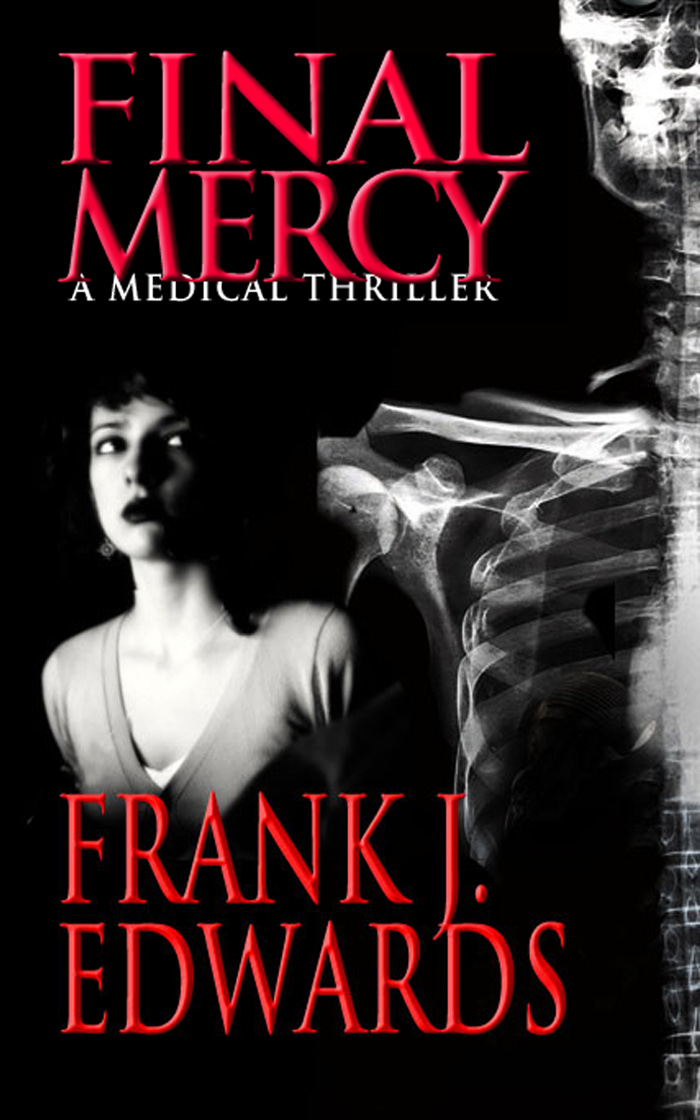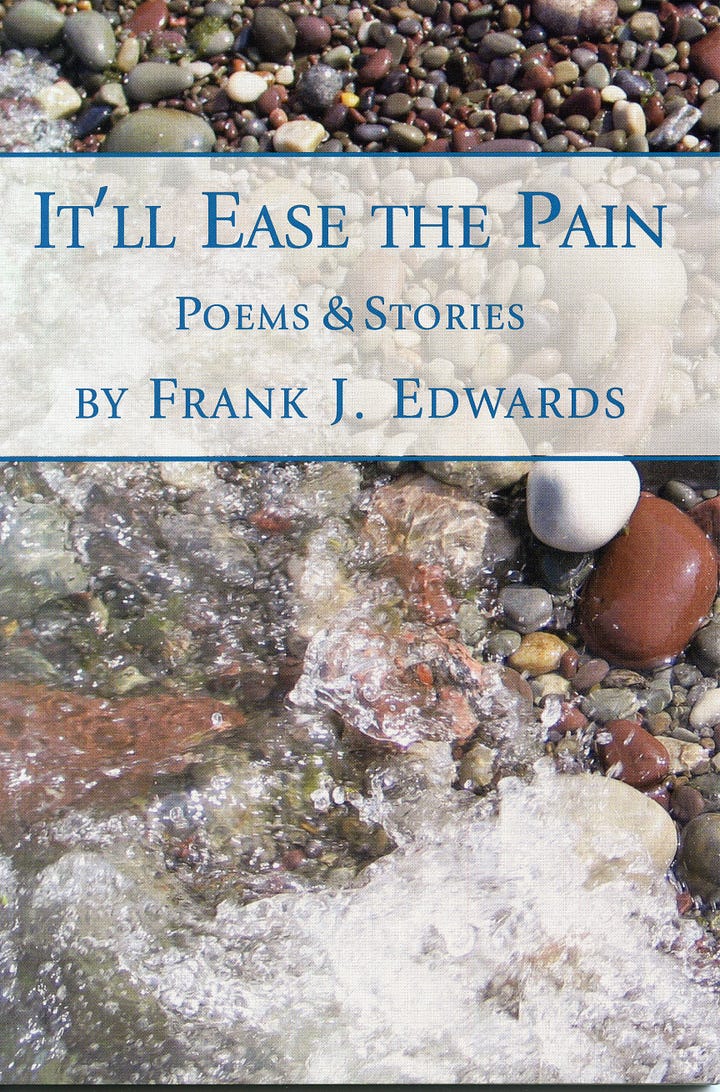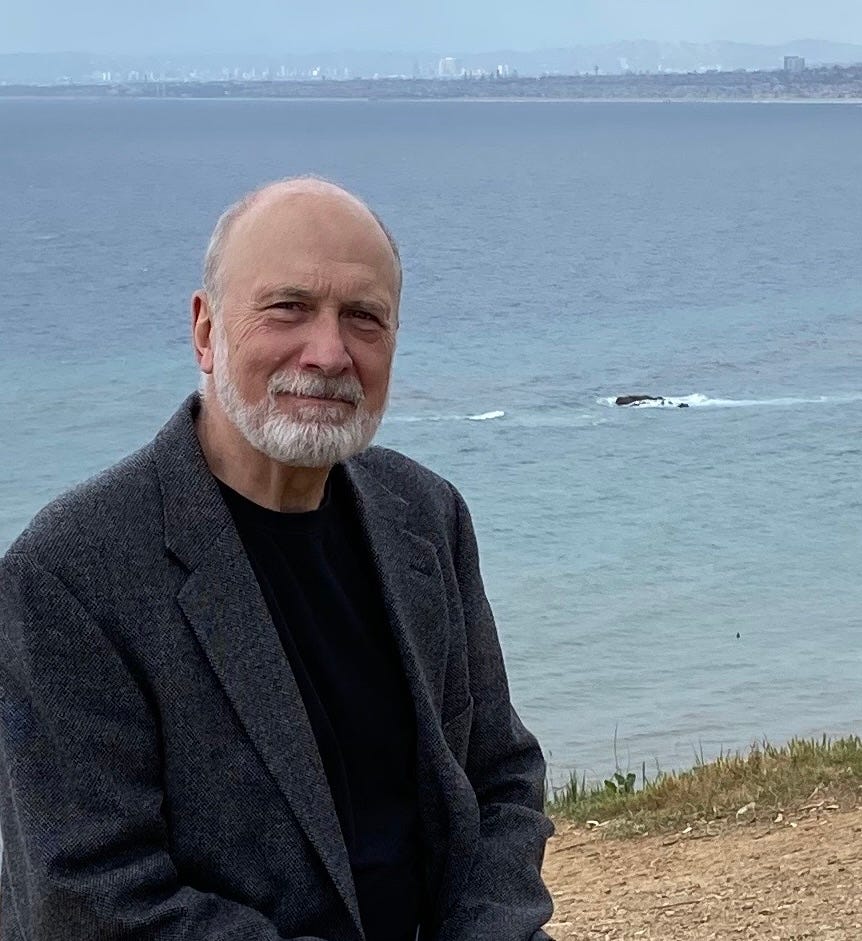An Interview with Novelist, Physician, Former Helicopter Pilot Frank J. Edwards
"My path to being a writer is a bit circuitous."
Frank Edwards and I met in a 2021 online screenwriting class taught by a well known purveyor of these courses. I won’t mention the instructor’s name because it soon became apparent he was doing little to no outside prep (several lectures prerecorded years earlier, no critiques of our work other than a 3-page scene he read in one of our class meetings.)
As a writing professor myself, this sort of thing infuriates me. If you’re charging people many hundreds of dollars for a class, don’t mail it in!
As my friend Sheryl once said after hearing me vent about a different frustration: “It’s information,” as in, the school of life offers many courses; this one is “Who/How You Don’t Want To Be.”
The best thing to come out of the screenwriting class was my friendship with Frank. He is a gifted writer and a generous soul. Recently, he took the time to answer a few questions about his current writing practice and his formative years as a novelist and poet.
Christine/Bookish: You were a helicopter pilot in Vietnam and later became a physician. How did you find your way into an MFA program and begin writing novels, poems, and short stories?
Frank J. Edwards: My path to being a writer is a bit circuitous. I’d left college back in the late 1960s after a dismal first semester and got swept up in the army. I’d always loved to read and had started seriously writing poems and stories as a teenager, but I was unfocused, my passions rebellious and jumbled. Rather than waiting to be drafted, I enlisted for flight school and turned twenty as the aircraft commander of a Huey flying in the Central Highlands of South Vietnam, which was enlightening in more ways than one.
After missions, I began devouring the work of writers like Kurt Vonnegut, Hemingway, and Richard Brautigan. (Many of my comrades were also college dropouts; good paperbacks always floated around the ready room).
The thought of becoming a physician took shape while I was over there. I felt that I could both write and be a doctor, à la William Carlos Williams.
Starting college, I majored in chemistry and English (squeezing through a loophole to substitute creative writing for freshman composition). I fell in love with the Beat poets and began getting poems published while still in med school. The specialty of emergency medicine drew me partly because it allowed stretches of time to write. Soon I was getting stories published, along with more poems, and even medical articles for lay readers.
But I wanted to up my game and found out about a low-residency MFA program at Warren Wilson College not far away. It was a great experience. I’d originally requested the poetry track but they shunted me instead into fiction. I took full advantage of that story training and never rubbed it in when the Virginia Quarterly Review accepted two of my poems the following year. As I settled into practicing and raising a family, I devoted most of my limited writing time to novels.
CS: You've published several books, among them Reap and Final Mercy - both medical thrillers, The Problem with Zero - a poetry collection, and It'll Ease the Pain - stories and poems. Do you generally alternate between writing poetry and fiction, i.e. you might have a poem going while you're writing a story or a novel?


FJE: I love taking short breaks from novel writing to work on poems. But not for too long, thanks to a nagging conscience. My best poems come out of the blue; I’ve never been able to will a good one into being. In general, my writing habits remain a work in progress. I’m an incorrigible procrastinator. (Banish thee – New Yorker!) Too often it seems like the last hour of a writing day is when the rock starts to roll and it’s hard to stop. That’s okay; it makes one eager to get back the next day.
I’ve had many productive spurts of writing between seeing patients and on slow nights in the ED. I think it was Garrison Keillor who mentioned that writing is what happens between doing other things. I’m sure W.C. Williams would have agreed. I try to set a word goal of a thousand per session, and I keep in mind the “shitty first draft” principle.
When I feel stalled, a session at the coffee shop often helps. (I’ve known a glass of wine to help too, but only after sunset). I have not been drawn to writing short stories for quite a while and have fallen out of practice, though I love the form and read many.
Every comment about the difficulty of getting a book traditionally published these days is true – if not understated. Not only must you be a good writer, but you must also be insanely persistent, or hit the right nerve, and/or be very lucky.
CS: As noted above, you've written medical thrillers, and I'm wondering how much you draw on your actual experiences as a doctor when you wrote these novels. I'm guessing they really are fiction but there is some verisimilitude.
FJE: You’re spot on. After writing a number of flailing novel manuscripts over the years, I came up with the character of Jack Forester, an engaging emergency physician with a complex past who is struggling to improve his department. From there it was easy (and fun) to invent a multidimensional villain (the medical center dean with a hidden psychosis), and soon I had a functioning plot and even the basis for a series.
I drew heavily on my own experience – trying to make the medical scenes as vivid as possible while avoiding clichés. The result was Final Mercy. I wanted Jack to develop as a character and grow, so the next novel, REAP, sees him higher up the administrative ladder facing an even weirder villain. The same for the third and final book in the series, The Witch Doctor’s Web.
CS: You've published your books with independent presses - would you talk a little about this? What was the editorial process like? And how did you get the word out about your titles?
FJE: Every comment about the difficulty of getting a book traditionally published these days is true – if not understated. Not only must you be a good writer, but you must also be insanely persistent, or hit the right nerve, and/or be very lucky. (Or be a celebrity, and not necessarily in the good neighbor sense).
I have tried hard not to become cynical about the process. It is what it is. And there are alternatives. After failing to attract an agent, Final Mercy was fortunate enough to land with Liz Burton, who runs the one-woman Zumaya Press out of Austin, Texas. She was a brilliant and incredibly efficient editor. Subsequently, I published REAP with David Pascal’s tiny independent operation out of my home city of Rochester, NY because I could benefit from his marketing and editorial expertise face-to-face.
The Witch Doctor’s Web (which I think is the best of the three Jack Forester books) is still making the rounds of agents. [Interested publishers/agents—Please drop me a note and I’ll put you in touch with Frank. - CS]
My poem and story collection, It’ll Ease the Pain, was published by the University of Rochester’s Meliora Press, where I was teaching a creative writing workshop to medical students. The experience there was excellent. As for marketing, I’ve done virtual book tours, blogs, and Goodreads giveaways and have come away with the impression that while it’s important, I have no talent whatsoever for it.
CS: What are you working on now?
FJE: I’m well into the drafting of an historical novel far removed from anything I’ve ever tried before. The year is 1774 and a twenty-year-old surgeon from Banbury, England, who has not yet finished his full apprenticeship, is coerced by British Intelligence to practice in Virginia in order to spy on a potentially very dangerous traitor to the Crown, his cousin, George Washington. It’s a coming-of-age story, and the more I research, the more I feel the resonances between those times and ours.
Frank J. Edwards is a writer, emergency physician, and medical educator. He has published two novels with independent presses, two nonfiction books (with Henry Holt and Hanley & Belfus), and a collection of poems and stories (University of Rochester’s Meliora Press). His short stories and poems have appeared in literary journals including Virginia Quarterly Review. He has received Louisiana State University’s Eyster Prize in short fiction, and prior to college, he served as a U.S. Army helicopter pilot; after medical school he earned an MFA in creative writing from Warren Wilson College.






Fascinating conversation!
Fantastic interview. Loved what you got out of him with those questions. Now I’m excited to check out more work from the both of you